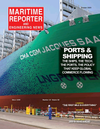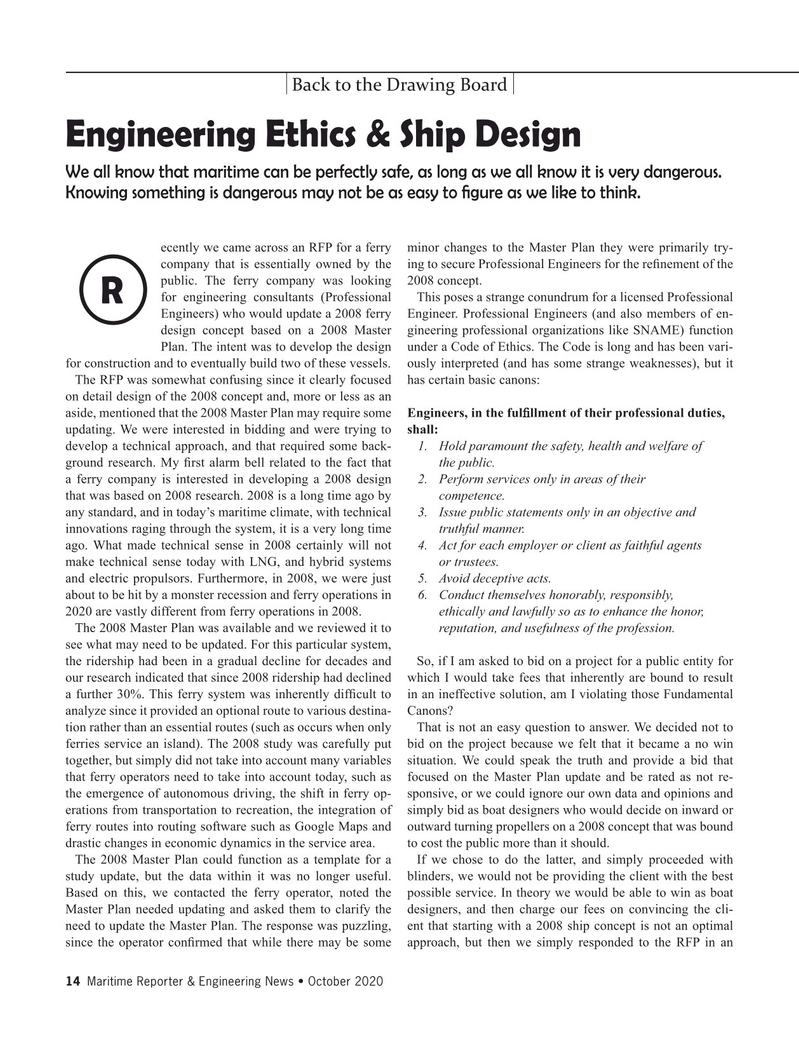
Page 14: of Maritime Reporter Magazine (October 2020)
Shipping & Port Annual
Read this page in Pdf, Flash or Html5 edition of October 2020 Maritime Reporter Magazine
Back to the Drawing Board
Engineering Ethics & Ship Design
We all know that maritime can be perfectly safe, as long as we all know it is very dangerous.
Knowing something is dangerous may not be as easy to ? gure as we like to think.
ecently we came across an RFP for a ferry minor changes to the Master Plan they were primarily try- company that is essentially owned by the ing to secure Professional Engineers for the re? nement of the public. The ferry company was looking 2008 concept.
for engineering consultants (Professional This poses a strange conundrum for a licensed Professional
R
Engineers) who would update a 2008 ferry Engineer. Professional Engineers (and also members of en- design concept based on a 2008 Master gineering professional organizations like SNAME) function
Plan. The intent was to develop the design under a Code of Ethics. The Code is long and has been vari- for construction and to eventually build two of these vessels. ously interpreted (and has some strange weaknesses), but it
The RFP was somewhat confusing since it clearly focused has certain basic canons: on detail design of the 2008 concept and, more or less as an aside, mentioned that the 2008 Master Plan may require some Engineers, in the ful? llment of their professional duties, updating. We were interested in bidding and were trying to shall: develop a technical approach, and that required some back- 1. Hold paramount the safety, health and welfare of ground research. My ? rst alarm bell related to the fact that the public. a ferry company is interested in developing a 2008 design 2. Perform services only in areas of their that was based on 2008 research. 2008 is a long time ago by competence. any standard, and in today’s maritime climate, with technical 3. Issue public statements only in an objective and innovations raging through the system, it is a very long time truthful manner. ago. What made technical sense in 2008 certainly will not 4. Act for each employer or client as faithful agents make technical sense today with LNG, and hybrid systems or trustees. and electric propulsors. Furthermore, in 2008, we were just 5. Avoid deceptive acts. about to be hit by a monster recession and ferry operations in 6. Conduct themselves honorably, responsibly, 2020 are vastly different from ferry operations in 2008. ethically and lawfully so as to enhance the honor,
The 2008 Master Plan was available and we reviewed it to reputation, and usefulness of the profession.
see what may need to be updated. For this particular system, the ridership had been in a gradual decline for decades and So, if I am asked to bid on a project for a public entity for our research indicated that since 2008 ridership had declined which I would take fees that inherently are bound to result a further 30%. This ferry system was inherently dif? cult to in an ineffective solution, am I violating those Fundamental analyze since it provided an optional route to various destina- Canons?
tion rather than an essential routes (such as occurs when only That is not an easy question to answer. We decided not to ferries service an island). The 2008 study was carefully put bid on the project because we felt that it became a no win together, but simply did not take into account many variables situation. We could speak the truth and provide a bid that that ferry operators need to take into account today, such as focused on the Master Plan update and be rated as not re- the emergence of autonomous driving, the shift in ferry op- sponsive, or we could ignore our own data and opinions and erations from transportation to recreation, the integration of simply bid as boat designers who would decide on inward or ferry routes into routing software such as Google Maps and outward turning propellers on a 2008 concept that was bound drastic changes in economic dynamics in the service area. to cost the public more than it should.
The 2008 Master Plan could function as a template for a If we chose to do the latter, and simply proceeded with study update, but the data within it was no longer useful. blinders, we would not be providing the client with the best
Based on this, we contacted the ferry operator, noted the possible service. In theory we would be able to win as boat
Master Plan needed updating and asked them to clarify the designers, and then charge our fees on convincing the cli- need to update the Master Plan. The response was puzzling, ent that starting with a 2008 ship concept is not an optimal since the operator con? rmed that while there may be some approach, but then we simply responded to the RFP in an 14 Maritime Reporter & Engineering News • October 2020
MR #10 (1-17).indd 14 10/6/2020 8:37:14 AM

 13
13

 15
15
